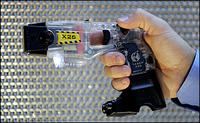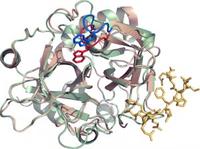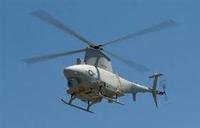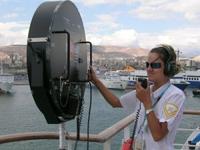-
Supreme Court rules against GPS tracking
On Monday, in a landmark case, the Supreme Court ruled that law enforcement agencies needed a judge’s approval before using GPS technology to track a suspect
-
-
High-tech developments help end high-speed pursuits safely
New technological developments are helping police officers end high-speed pursuits without jeopardizing the safety of themselves or the suspect
-
-
Reduced prices for license plates readers attracts more buyers
Now that the cost of Automatic License Plate Readers (ALPR) has dropped $17,000 from its initial price of $24,000, these devices are becoming increasingly common with more and more police departments across the country purchasing them
-
-
Also noted
Minn. police give body cams a tryout | Law enforcement technology aims to step up policing |New Jersey paves the way for stun gun deployment | Tomorrow’s law enforcement technology today | 18th century wisdom guides Supreme Court’s GPS ruling | Technology helps police become more efficient | Smart911 sees rapid growth in 2011
-
-
Taser International reports orders by law enforcement

Quibbles about the use of taser guns notwithstanding, figures released by Taser International show that police departments around the United States continue to favor the company’s stun guns, and also other law enforcement gear the company offers
-
-
Sponges stop troops from bleeding out

Researchers at MIT have created special sponges that can help stop bleeding almost instantaneously; the sponges have been given a coating that includes thrombin, a clotting agent found in blood
-
-
DHS IG: Cook County communications program botched

On Monday the DHS Inspector General blasted officials in Cook County, Illinois for mishandling a $45 million federally funded project to upgrade communications equipment for first responders; the Inspector General said the Cook County program, dubbed Project Shield, was fraught with trouble from the start, resulted in equipment that did not work, and potentially wasted millions of taxpayers’ dollars
-
-
Helping UAVs to land safely in an emergency

One obstacle to the wider use of UAVs in domestic missions such as law enforcement is the fact that UAV flight plans are set pre-flight, and if something goes wrong and they need to land they have no way to determining where the safest landing spot is; in most cases they just drop; engineers are developing a system which will allow UAVs sense and avoid other traffic and determine appropriate landing spots should the need arise
-
-
Sector Report for Tuesday, 10 January 2012: Law Enforcement Technology
This report contains the following stories.
Plus 1 additional story.
-
-
Carbon Motors faces uncertain future
Carbon Motors, the makers of the specially designed E7 police car, are struggling to survive financially and could be forced to shutter its doors if a $300 million government loan is not approved
-
-
Open-source searches help solve cold cases
Two detectives receive the LexisNexis One Step Closer award for effectively using searches of open or third-party information sources to solve cold cases
-
-
LA sheriff department upgrading its 1980-era terminals
The Los Angeles Sheriff Department is upgrading its 1980s-era terminals, for which it had become difficult for the largest sheriff’s agency in the United States to find parts; the upgrade – Raytheon’s Mobile Digital Computer System (MDCS); the MDCS project and major technology upgrade represents the largest-ever deployment of mobile digital computers to a sheriff’s department in the country
-
-
Protests spur sonic blaster sales boom

With the spate of protests from the Occupy Wall Street movement sweeping across the country, there has been a surge of interest in non-lethal crowd control systems; in particular U.S. police and first responders have taken a keen interest in Long-Range Acoustic Devices (LRAD)
-
-
LAPD abandons plans to move to Google cloud server
The Los Angeles Police Department (LAPD) recently announced that it had scrapped its plans to move its email servers to a Google-based cloud system citing the technology’s inability to meet certain FBI security requirements
-
-
Sector Report for Tuesday, 27 December 2011: Law Enforcement Technology
This report contains the following stories.
Plus 1 additional story.
-
- All
- Regional
- Water
- Biometrics
- Borders/Immig
- Business
- Cybersecurity
- Detection
- Disasters
- Government
- Infrastructure
- International
- Public health
- Public Safety
- Communication interoperabillity
- Emergency services
- Emergency medical services
- Fire
- First response
- IEDs
- Law Enforcement
- Law Enforcement Technology
- Military technology
- Nonlethal weapons
- Nuclear weapons
- Personal protection equipment
- Police
- Notification /alert systems
- Situational awareness
- Weapons systems
- Sci-Tech
- Sector Reports
- Surveillance
- Transportation
Advertising & Marketing: advertise@newswirepubs.com
Editorial: editor@newswirepubs.com
General: info@newswirepubs.com
2010-2011 © News Wire Publications, LLC News Wire Publications, LLC
220 Old Country Road | Suite 200 | Mineola | New York | 11501
Permissions and Policies
Editorial: editor@newswirepubs.com
General: info@newswirepubs.com
2010-2011 © News Wire Publications, LLC News Wire Publications, LLC
220 Old Country Road | Suite 200 | Mineola | New York | 11501
Permissions and Policies
